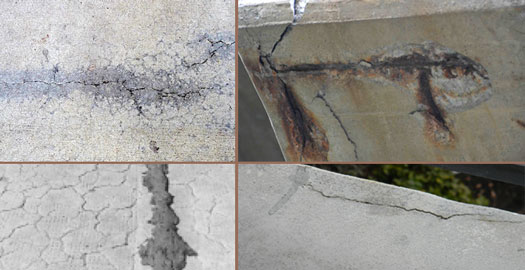
Concrete deterioration can be caused by a variety of factors, including improper installation, poor mix design, poor quality control at the plant, poor curing conditions and an improperly designed surface for the use. If you notice any signs of concrete deterioration, a NJ structural engineer can help you.
1. Chemical Penetration
Chemical penetration from acids, acidic water and deicing solutions can cause concrete deterioration. These substances penetrate the surface of the concrete and break it down, causing cracks, pits and divots.
2. Corrosion
Corrosion most typically occurs in the structures used to reinforce the concrete, like steel rebar, when water or chemicals seep into the concrete and come in contact with the reinforcing structures. This causes a loss of strength in the concrete and can lead to cracking and crumbling.
3. Delamination
Delamination of concrete occurs when the top portion of concrete separates from the lower layers. This usually happens at the result of an installation error where the aggregate settles rapidly and the smaller sand and rock particles float to the surface of the mix or from rusting and swelling reinforcement. Delamination can be identified by tapping the concrete and hearing a hollow or dull sound.
4. Disintegration
Disintegration and/or erosion of the concrete occurs due to environmental factors. Freeze/thaw cycles, chemicals and water combined with sand and other particles can degrade the surface of the concrete, causing crumbling and cracks.
5. Aggregate Alkali-Silica Reactions
Aggregate contains silica that can react with the alkaline nature of the mortar, causing widespread cracking of the concrete in a scale-like pattern. Taking proper precautions, like adding certain chemicals or ash into the mix can help prevent this problem.
6.Scaling
Concrete scaling refers to concrete that is losing its mortar, which exposes the aggregate underneath the surface. Scaling most commonly occurs after several freeze/thaw cycles. Ensuring that the concrete is properly installed and cured can help prevent this problem. If scaling is noticed, the affected concrete should be removed and replaced.
7. Spalling
Spalling concrete refers to concrete that has flaked and pitted. This type of damage can occur due to poor installation or when the concrete has been stressed beyond its designed tensile strength. Ensuring the mix of concrete is right for the application and proper installation can help prevent this problem.
Getting Your Concrete Inspected by a NJ Structural Engineer
Our NJ structural engineers, here at Structural Workshop LLC, offer services that can help you determine the causes of your concrete deterioration and offer you solid advice on how to repair it. If your concrete is cracking, delaminating or crumbling, give us a call today at 973-771-6970.
